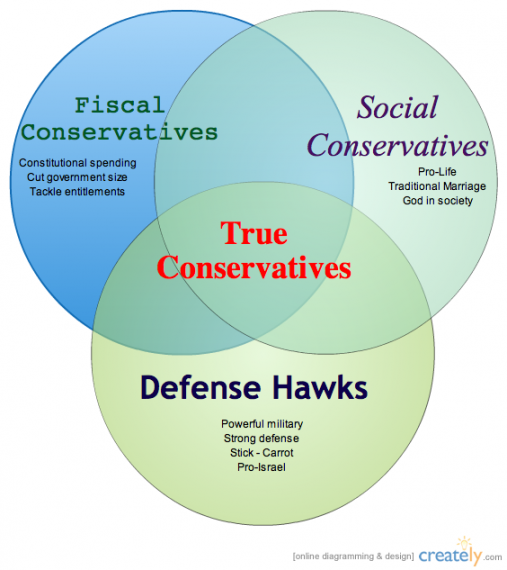Who’s A Conservative?
While most Americans consider themselves "conservatives," some conservatives exclude most Americans from the definition.
Melissa Clouthier asks, in light of a series of well-publicized boycotts and other kerfuffles surrounding this year’s Conservative Political Action Conference, “Should Libertarians Be Banned from CPAC?” While I’d differ a bit on the framing, I agree with her analysis and conclusion: CPAC is a place to discuss conservative ideas and build an agenda, so everyone who’s remotely part of the conservative coalition ought to be invited to the conversation.
But CPAC itself is something of an anachronism that few care about. Frankly, the program itself has been tired and annoying for years. I’ll go again this year, but mostly to see a handful of bloggers and others who I only see at CPAC. And because it’s nearby and I get blogger’s credentials for free.
The more interesting question is: Who’s a conservative? Melissa discusses that issue at length and I’ll leave it to you to click through and read it. I’ll use her Venn diagram, though, as a jumping off point:
From the time that I first started to care about politics, as a 14-year-old during the Iran Hostage Crisis and the Reagan-Carter election, until just a few years ago, I’d have considered myself to fit within the True Conservatives inner circle. Now, I’m much squishier at a time when the Republican Party, the vehicle for enacting conservative principles into public policy, has gone substantially more hard core.
Fiscal Conservatism:
This remains the pillar in which I’m by far the strongest. The United States government spends far too much money and accounts for too large a chunk of GDP. While I’m not an absolutist on the Intent of the Frames, I’d agree that large chunks of the budget go outside a reasonable interpretation of Federal authority. And, certainly, entitlement spending is out of control.
But even here, I don’t worship at the alter of tax cuts. I prefer taxes low philosophically and economically and, in recent years, my ideology has begun to coincide with my interests. We’ve got to pay our way — an idea that used to be a fundamental precept of fiscal conservatism. And the Laffer Curve curves. There are diminishing returns to rate cuts.
Defense Hawkishness:
I’d still consider myself a defense hawk under any reasonable measure. I’m perfectly happy for my country to have the most powerful military on the planet and have no moral qualms about using military power to further our national interests when other tools fail us.
Then again, I’m not knee jerk. We could easily maintain superpower status on half the current defense budget. And I’m not a “national greatness conservative” who believes we should intervene anywhere and everywhere to spread democracy.
I’m not sure why “Pro-Israel” is under this category but I suspect I don’t qualify. I consider Israel our best ally in the region and want her to succeed. But I’m an American nationalist and think we should base our foreign policy entirely on our own interests. I happen to think a strong Israel and a strong Europe are in America’s interests. But, just as we will occasionally diverge from France in our calculations, we should make decisions in the Middle East in a holistic manner that will sometimes mean going against the will of the Likud Party.
Social Issues:
I’m a Southerner by culture and grew up around and served in the military. So I’ve got a pretty strong social conservative streak. But I’m also an atheist. So, this is easily the weakest part of my conservatism.
Although I don’t come by it through religious precepts, I’m anti-abortion. But I’m squishy on the issue. Since my opposition to abortion doesn’t come from a belief in a soul or sin, I’m fairly agnostic about morning after pills and a firm believer in contraception. And, while I don’t like it, I’m not up in arms about very, very early term abortions. And, while I’m not absolutely sure what I’d do if faced with the choice myself, I think people should make informed choices about high risk pregnancies and should have the right to abort a fetus that’s severely defective.
Then again, the law is all but settled on abortion, with the debate at the fringe of the margins. We’re not going to overturn Roe v. Wade if we elect Sarah Palin to two consecutive terms, followed by two more for Michelle Bachmann.
I’m in a reasonably traditional marriage, whatever that means these days. My wife and I got married relatively late, but it’s the first marriage for both of us and neither of us had kids before getting married. I was anti-gay marriage — and, frankly, anti-gay in the way that you’d expect for a Southern former Army officer born in 1965 — until a few years ago. But gays have gone from a bizarre theoretical to actual people for me. And, while I’m not marching in the streets demanding marriage equality, I can’t for the life of me come up with a reason why Adam and Steve shouldn’t be able to marry one another.
As an atheist, the “God in society” thing is very, very low on my agenda. I’m not a militant on the issue, and actually think the pendulum has swung too far in the direction of avoiding hurting the feelings of the non-Christian minority. But I do think we’ve got bigger fish to fry.
CPAC, the Tea Party, Libertarians, GOProud, and the GOP
As those who’ve read my blogging from the last few CPACs know, I find most of the speeches annoying, at best. Then again, I find most political speeches annoying. The problem, for me, is that I’ve heard it all before. And most of the speeches aimed at True Believers are a combination of the standard red meat talking points and absurd characterizations of the other side. But, then, the target audience is the college kid who’s at his first CPAC and come all the way from Albuquerque, not a cynical, 45-year-old PhD who works in DC.
While the Conservative Movement isn’t the Republican Party and CPAC is neither of the two, the overlap is nonetheless high. At CPAC 2008, Mitt Romney seemed to be the plurality choice, even though he’s by no means a True Conservative. CPAC 2010 cheered Scott Brown, who’s less conservative than I am, as a conquering hero.
I get that the “gay agenda” is antithetical to most conservatives. But the Log Cabin Republicans have been regulars at CPAC since I started going in 2004. (And probably before, but I have no knowledge.) So, I’m not sure what the big deal is with GOProud, unless it’s because their name makes them seem to be less unapologetic about their homosexuality.
The Tea Party movement makes me uncomfortable. But it’s not so much because I disagree with them ideologically but because they come across as uninformed yahoos. Then again, I know plenty of people who are neither uniformed nor yahoos who consider themselves Tea Party people. So, maybe, it’s just a matter of how populist movements come across on TV and the fact that a couple of leaders who I find incredibly unappealing, Palin and Bachmann, have glommed onto the movement and made themselves its national face.
I’m also not a huge Ron Paul fan. Although, again, it’s more a matter of his coming across as nutty than sharp ideological disagreement. But I’m absolutely fine with the Paulites showing up at CPAC and trying to influence the debate.
The bottom line is that America is a two-party state and that means putting together large coalitions of people who don’t necessarily like one another or agree with one another in order to get things done. And, while CPAC isn’t the Republican Party, the distinction is almost meaningless. Most Republicans have considered themselves “conservatives” since the days of Ronald Reagan. Even the so-called “Reagan Democrats” label themselves as “conservatives” nowadays, since they tend to be defense hawks and at least moderately conservative on the fiscal and social issues.







I can’t believe there are all these questions about who should and shouldn’t be at CPAC, with NO mention from any of the people with these questions about the fact that the John Birch Society is there. What next, the Council of Conservative Citizens? “Conservative” 9/11 troofers? (most of them are Paulbots anyway)
Best post on conservatism I’ve read in….a long time.
In a two party system, does it really matter what you call yourself other than Republican or Democrat?
The only reasonable thing to call yourself is independent (small “i”).
Beth, what disparate groups populate the democrat demographic? For the first time I agree with Ponce.
James- The problem is that the true conservatives decide the primary elections. That means you will likely need to decide whether to not vote in 2012, which includes voting libertarian, or vote for a Democrat.
Steve
Steve: The possibility has occurred to me. I don’t think Palin can win the nomination but can’t imagine voting for her, much less Michelle Bachmann.
On the other hand, the party nominated John McCain in 2008. He was hardly the most right-wing candidate in the field. Nor was George W. Bush the most-right wing candidate in 2000. Or Bob Dole in 1996 or GHW Bush in 1988.
So, we’ll see. Based on my cursory knowledge of them right now, I don’t think I’d have a hard time voting for Romney, Pawlenty, or several other plausible Republican nominees in 2012.
“The Tea Party movement make me uncomfortable.”
You need to get to know them better.
“On the other hand, the party nominated John McCain in 2008. He was hardly the most right-wing candidate in the field. Nor was George W. Bush the most-right wing candidate in 2000. Or Bob Dole in 1996 or GHW Bush in 1988.”
Which seems to be why there is a push to nominate a true conservative this time. Still, you may be right. It’s a long time until the nominations start. I remain surprised that you place much hope for Romney. I expect him to get skewered for Romneycare.
Steve
****For the first time I agree with Ponce.****yup…..um….yup.
My version: Money, Bombs and Jesus.
You sound to me James as if you’re just over the 50 yard line to right, as most of us on the other side, contrary to the beliefs of some who comment here, are just over the 50 yard line to the left. We’re that awful “moderate” that figures hugely in the nightmares of those who think being reasonable means you’re on the fast track to perdition.
Good analysis of the problem of conservative identity. I am a fairly conservative person who grew up on the left coast–and it isn’t called that purely for the poetic elements of the title, IMO–and the problem that I have now is that the views most conservatives seem to hold don’t seem logical to me, either. While I am socially conservative–more so than you because I am not an atheist and was raised Baptist–I also acknowledge the Christian ideal of agency, which give people the right to do as they choose, so I can’t go with the right on social issues–it the right wants better actions on the part of society, persuade the society to act better instead of believing laws will make people good. I believe in a strong defense establishment, but come from the days when “planting Democracy” was the province of the Internationalists on the left, and I simply can’t see the bottom line in the tax policy and advocacy of “creative destruction” of businesses and jobs to fuel economic growth. Sadly, the left isn’t any better or wiser…………….
Now, I’m much squishier at a time when the Republican Party, the vehicle for enacting conservative principles into public policy, has gone substantially more hard core.
Hard core how? Complaints about Big Government aside, they seem not to have strong ideas on what to cut and became ardent defenders of not touching Medicare. And, or course, when they were in power… On social issues, on the gay marriage issue their “move to the right” is actually standing in the same place (or moving slightly to the left) of their previous spot. The only social issue they’ve been taking action on is defense. On defense issues… well, they’re pretty much spent.
On the other hand, they certainly sound like they’ve moved further to the right. But these days I wonder if all of the noise is to compensate for the lack of action. They can’t seem to gain any traction agreeing with one another and with the general public in the way of specifics, so they bark louder and louder like my dog does when she is safely separated from the target of her volume by a fence.
None of this is to argue that you should become a Democrat. Or that you should not refrain be at arm’s length from your party because they’re “not that extreme.” But I look at it as something that the Republican Party is going to have to resolve. The gulf between their words and their specific positions (never mind their actions, where you can always expect a disconnect regardless of party) seems to be growing wider. Even aside from “which kind of conservative are you”, the question of “what does conservatism mean as it translates to actual policy” is becoming harder to ignore.
Maybe this will change in the run-up to the 2012 when they’re fielding a candidate that is going to need something in the way of proposals and more specific priorities than refudiating socialism.
My above comment should not be taken as criticism of James (which is what I was trying to say in the opening to the penultimate paragraph).
It’s just that a big part of the reason that Obama and the Dems won in 2008 is that the Republicans and conservative movement ran out of steam (in part due to the dissonance between what conservatives want and what Republicans were able or willing to give them as well as the inability to create a robust economy). The Republicans seem likely to come back into power at some point (and already took the House) on the same basis.
It’s a game of shirts and skins. I can’t tell you how many people I know that are ostensibly liberal that I want to say “You aren’t liberal, you just REALLY HATE this or that type of conservative” and how many people I know that are ostensibly conservative where it’s obvious that the root of their conservatism is a deep antipathy towards some group that is aligned with the liberals.
I’m not saying that there are no differences between the parties. There are in style and in substance. But there really seems to be a disconnect (outside of particular realms) between what members of each tribe believe and what these differences actually are. People on both sides generally support good regulation and oppose bad, for example, and can get on board with government/market combination solutions (or purely government ones that are already on the books), but the extent to which a regulation is considered good or bad, and whether the government/market combination is a good one, depends in good part on who is proposing it.
“Hard core how?”
By the total unwillingness to brook even the slightest variation from the rhetoric. When people like Lugar and Grassley are routinely called liberals then the reactionaries have gone completely around the bend.
A major symptom of this is the undercutting of independent and impartial sources of information. The systematic attempts to discredit information sources or replace them with conservative versions is disturbingly Orwellian.
Will:
Yes, pretty much what Tlaloc says. I’m not sure that the Tea Party movement is all that radical ideologically; but they’re rabid in tenor and tone.
I used to call myself a “Phil Gramm Republican” and have lately updated it to “Chuck Hagel Republican.” But, whereas those men were once considered central parts of the coalition, they’re both on the outside looking in these days. To Democrats, they’re still conservatives. To many conservatives, though, they’re RINOs.
The McCain cycle was hardly a demonstration of flexibility. For McCain to get the nomination, he had to stop being McCain, and almost literally bend knee before the preachers.
and yet, your site is titled “Outside the Beltway”.
Likewise, I do not know what a “true” conservative looks like, but I can readily identify squishy conservatives. The ITB Davids come to mind, Brooks, Frum, etc.. To other conservatives, I may seem squishy – I think abortions should be legal, I support gay rights, I think many drugs should be de-criminalized – but I don’t blast those who agree with me on core principles just because it fits better in the “polite” inside the beltway society. I detest that ITB crowds require that Rush Limbaugh, Ann Coulter, and Rick Santorum be lambasted, while Ed Schultz, Paul Krugman, and Barbara Boxer be revered. It is a double standard that far too many ITB conservatives have conveniently adopted.
(for party favors I’m sure /snark)
And for me, squishy conservatives are those that profess core conservative principles, up until they are challenged by fellow participants of their cocktail circuit.
Heh. You’ve got to be pretty far left of me, the independent, to think that Paul Krugman and Barbara Boxer be revered.
Actually, it’s a weird list, equating the bleeding hearts on the left with hucksters on the right. Neither group is admirable, but they miss for different reasons.
Bains:
As explained on the About page: “The site’s moniker was both descriptive and ironic: James had moved from Troy, Alabama to the Washington, D.C. exurbs of Dulles, Virginia to take a job in the publishing industry five months earlier. So, an author with a decidedly outside-the-Beltway mindset was now living in very close proximity to said Beltway.”
I still live *barely* outside the beltway but have a day job inside it. Doug lives in the area, too, although a little further out. The rest of the contributors live all around the land: Alabama, Kansas, Texas, Wisconsin, Kentucky, etc.
I blast Limbaugh and Santorum when they say things I disagree with, but have defended them both. It’s pretty hard to defend Coulter. Krugman’s a brilliant economist who seems like a nice guy but holds a lot of views on domestic issues I disagree with. And I don’t know anyone who “reveres” Ed Schultz or Barbara Boxer.
If the geometry of the diagram is to be taken at least partially literally, put me at the intersection of the two green circles just north of the red “C” in “Conservative.” Fairly biased towards the libertarian wing of the party.
I strongly suspect that a majority in the nation actually resides there, and if such a candidate were nominated, would win in a landslide.
BTW – James, I’ve often heard comments here and at GE about the ability to cut the defense budget. That no doubt is true, after all, its a government related/funded organization with political constitencies, power bases etc. But its the first time I’ve heard anyone here take a stab at the number. Intuitively half that seems high, but I’m no defense budget expert. However, if that’s the case, its impossible to imagine the non-defense budget cannot be significantly cut, for all the same expense drivers pertain there as well.
Dr. Clouthier writes:
“For those irritated by the Gay Marriage idea being allowed in the tent, isn’t it time to do something at the event to convince the attendees of the value of Traditional Marriage?”
Does anyone actually argue about the value of traditional marriage? What is she trying to say there?
You should immediately see a problem when you’re comparing Krugman with Limbaugh and Coulter. Good grief.
> Does anyone actually argue about the value of traditional marriage?
Probably. Many of todays “conservatives” seem to have a real love affair going with pointless, empty symbolism. I guess something has to fill the vacuum created by not having solutions to any of our problems.
I detest that ITB crowds require that Rush Limbaugh, Ann Coulter, and Rick Santorum be lambasted, while Ed Schultz, Paul Krugman, and Barbara Boxer be revered.
I don’t think many people were aware of this requirement.
And…he left out George Soros. How can that happen? He’s the number one boogey man as Acorn and the New Black Panther Party fade away.
***Probably. Many of todays “conservatives” seem to have a real love affair going with pointless, empty symbolism. I guess something has to fill the vacuum created by not having solutions to any of our problems.***
Left back at you…..
http://www.dyslexia-parent.com/mag40.html
Crap, forgive me for messing up my stupid email for the millionth time…
But then I kinda pride my self on reading and writing between the lines….lol….
She could be talking about Traditional Marriage in the “husband obedient to God and woman abedient to husband” sense, or as a reaction to the Feminist contingent that considers marriage legal rape. Beats me. Maybe it’s code.
“I strongly suspect that a majority in the nation actually resides there, and if such a candidate were nominated, would win in a landslide.”
Yes, except for all those folks who want their Social Security, who want their Medicare, who want their tax subsidies, and on and on but just want fiscal responsibility to bother someone else, who want the government there for them, but want it to be cut somewhere else and except for those who probably know little to nothing about foreign affairs, but just want to be assured that the USA is still top dog…yes, except for all those people, I’m sure that a “majority” in the nation actually resides where you do…
Janis:
You really don’t get that? Half the attendees, and many of the biggest names, are divorced, often following scandals and affairs.
If I may quote from an unexpected source:
>i>”Why do you look at the speck that is in your brother’s eye, but do not notice the log that is in your own eye?”
Let’s see if conservatives can get Newt Gingrich to stop screwing his secretaries on his desk and divorcing his wife while she’s in the cancer ward, before they start lecturing us on morality.
So, Michael, you’re saying that she’s asking for a workshop on monogamy and tenacity in the average traditional marriage, as I would define it or Dr. Joyner would? I presume to speak for him, but we’re not “swingers” or open marriage advocates.
James, I’ve been a visitor of this site for quite a few years. As such, I’ve never visited your About page – never had a need. When I first visited, OTB had a definite OTB POV, but over time is has become closer and closer to an ITB POV, in my opinion. And believe you me, I am quite familiar with ITB – my grandparents lived in Chevy Chase (DoA), my folks in Bethesda (DoD).
For those commetors to biased to see, the comparisons I was drawing were between Limbaugh and Schultz (both successful talk radio hosts, both failed or failing TV talk show hosts), Coulter and Krugman (both hyperbolic columnists), and Santorum and Boxer (both elected members of Congress, both highly opinionated, both exhibiting foot-in-mouth disease). In all the ITB “cocktail parties” (conversations with friends and family, conversations with happenstance parings at Congressional Country Club, conversations in pubs on M-Street, events at Catholic, American, George Washington, George Mason & Georgetown Universities, etc) I have been privy to, it is perfectly acceptable to lambaste the former, yet if one draws the comparisons I do, you are shunned. The Davids listed above are kings at negotiating the perils of ITB life. Unfortunately, they have to sell part of their soul – or sacrifice a good part of their political ideology – to do so.
Add the following to the Venn Diagram: 1) Defense–Anti-Islamic Jihadism; 2) Social–Follow Natural Law and Rights, Defend the Constitution, No Judicial Activism, and Major Charity Contributions; 3) Fiscal–Major Tax Reform and No Redistribution of Wealth via Compulsory Taxes.
Then, the center and each component of the diagram hold more correctly to be–True Conservatism.
Bains — If you can’t tell the difference between a shrieking harpy like Coulter, who writes columns consisting solely of name-calling (John Edwards is a fag! Obama is ablack fag! Liberals hate freedom!) and Paul Krugman who, even if you disagree with every word he says is clearly a thoughtful, educated economist who is able to draw on tons of data to make his points, then you are simply illiterate. Even Coulter would laugh at you over this comparison.
And by the way, two other differences in your comparisons — Ed Schultz, while hardly the radio powerhouse Limbaugh is, is also not “failing” in television. I don’t like the guy’s show — I think he’s kind of a blowhard despite the fact I agree with lots of what he says. But he just got a major timeslot promotion at MSNBC. So the only reason you have to call him failing is your own hope.
As for Santorum and Boxer, well, Santorum is an ex-senator, humiliated in his bid for reelection, while Barbara Boxer just cruised to another term, kicking the stuffing out of a Republican empty suit. The Right has hated her forever, and keeps thinking they can kick her out of office — but we Californians are thrilled to call her our senator.
Perhaps the reason you are shunned for making these comparisons is that they’re really stupid.
bains: Any interesting point you’re making is lost in the utterly ridiculous comparison of Coulter to Krugman, as wr points out. (The others are also quite shallow, but not as obviously nonsensical.) It appears to be yet another chance to: 1) pick a lunatic from the right; 2) pick, oh, anyone from the left; 3) call them equal in some unimportant or slanted way and claim they cancel out. Doug attempted this recently in a comment, and it’s a dishonest argument. You’ve taken it to a new height, though!
wr, thanks for proving my point.
Which was what? That people laugh at your comparisons because they’re stupid?
When you look at things like gay marrage and compare it to conservative parties in other countries America is kind of unique in that religion is more closely aligned with it. In Australia, for example, where they have had gay marrage for a long time, it was the conservatives that argued for equal rights. I like that chart and think it is more useful then applying labels.
The thing about true conservatives (and true progressives) is that they’re all about purity – until it comes to election time, when they suddenly become much more flexible about who they want to include under their umbrella in terms of voters.
Interested Party –
That was weak, and uninteresting.
“That was weak, and uninteresting.”
Oh, then we have something in common, as the above is the perfect description of your endless bragging of what you supposedly have, who you supposedly know, and what you have supposedly done…
IP –
Bragging? I never brag. I’m one of the most humble people you could ever meet, for I’m in a business where there are people one routinely meets – and I mean every single week – who have accomplished far more than I. I am simply matter of fact.
As for the supposedly…………………I suppose (heh, get it? …. I know, keep the day job) you desperately want to believe that, for it may validate you in some odd way. But I’ve never spoken an untrue or embellished word here. Not once.
Sorry to dissappoint.
A belated point. Social conservatism is a social policy, not a political one. Indeed, in its demand for governmental action on moral issues, it is at odds with traditional principles of political conservatism.
The job of government is governance, the the philosophy and ideology that guide such governance is political.
The Republican Party has spent too much time 1. compiling planks or positions and calling them conservative, without evaluating the vailidty of such positions from within the framework of political conservatism; and 2. moving away form what should be its primary focus – good governance.